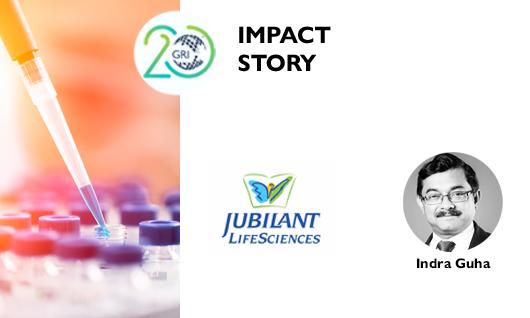Jubilant Life Sciences: Using GRI Reporting to Build a Sustainable Future for the Business

Jubilant Life Sciences is a pharmaceutical and life sciences company operating on a global scale. One of the pioneers in India, Jubilant has released a public sustainability report from 2003 onwards. We spoke to Indra Guha, Chief Sustainability Officer at Jubilant, about the benefits the reporting process has brought for the company.
Indra Guha: Sustainability reporting has had a significant impact on Jubilant’s business and approach to stakeholder engagement. Not only has it helped us improve our policies, systems and procedures to address business relevant sustainability topics, it has also helped us better understand the related performance parameters. This, combined with long-term target-setting, has resulted in overall improved sustainability performance. Using an internationally recognized framework such as GRI has provided us with a credible and comprehensive means to communicate on our sustainability initiatives and achievements to our key stakeholders.
Can you give us concrete examples of positive business impacts derived from sustainability reporting?
Reporting has helped Jubilant to develop a sustainable business model, facilitated by a structured system around monitoring, measuring and reporting on sustainability. Some of the areas we have made significant progress on include sustainability governance (policies, management systems etc), integration of sustainability in vendor qualification systems, formal stakeholder management, and assessing materiality.
Apart from strengthening internal systems, we have experienced some direct benefits to business in addressing the ever-growing expectations of our key stakeholders. An aspect that is of key interest to our global customers is how we do the external sustainability assessments. One of our facilities recently underwent an EcoVadis assessment, where we scored among the top 5% globally within the companies they had assessed. GRI reporting has played a key role in helping us respond appropriately to these assessments.
Another example is related to our supply chain. In response to the GRI G4 Guidelines requirements, Jubilant started to communicate about its suppliers’ sustainability performance from 2015–2016 onwards. A year from that, we already conducted a dedicated environmental and social audit for 50% of our external manufacturers. We have observed that many of our key suppliers have started responding proactively to our initiative and are gradually building a sustainability approach into their business processes, sometimes benchmarked with some of our good practices showcased in our sustainability report. I am sure this will help us embed sustainability practices more deeply across our supply chain.
Finally, GRI reporting has also helped us in preparing for and responding to national mandates on sustainability performance disclosure from Security and Exchange Board of India (SEBI) and Ministry of Corporate Affairs, Government of India. Following these mandates, Jubilant started reporting Business Responsibility Report (BRR) and CSR Reporting along with its annual report.
Which audiences is Jubilant’s sustainability reporting primarily catering to?
Jubilant has been expanding at a fast pace, and now has presence in more than 100 countries. The volume and landscape of Jubilant’s stakeholders are also changing quickly according to the geographical reach as well as the diverse product portfolio. Now the stakeholders, particularly customers and investors, want to know more about sustainability. Following the GRI guidelines, we have been able to generate a comprehensive disclosure through our sustainability report which aptly responds to the need of these stakeholders. We have referred investors, customers and even regulatory bodies to our sustainability report as a response to their queries. We have seen that this has given us advantage as a differentiating factor and a competitive edge in the market as well.
Jubilant is also assuring its reports. What value does that bring along?
In India, assurance of sustainability reports is not yet mandatory, unlike with financial reporting. However, Jubilant has sought assurance for its sustainability reports from the beginning. We see that external assurance by an independent third party enhances the perceived value of our sustainability journey to our stakeholders, particularly for investors and customers who are increasingly looking for external assurance. Further, we also get a confirmation on the effectiveness of our internal sustainability processes and controls through external assurance, which keeps us on a path of continuous improvement.
How are the Sustainable Development Goals (SDGs) affecting Jubilant’s business strategy?
As a responsible organisation we have taken the SDGs to heart and started aligning our existing business model with these global priorities. This is the theme of our 2016-2017 sustainability report as well: “Nurturing Inclusive Growth – Aligning with Sustainable Development Goals”. As part of our sustainable business model, Jubilant understands the importance of SDGs and strives to find another meaningful and visible purpose of doing business: contributing to achieving the global goals. While there are direct linkages of our business with some of the goals, some have indirect linkages; the SDGs act as a catalyst for further integrating sustainability principles into our strategy. The SDGs have also provided a framework for several of Jubilant’s ongoing CSR programs.
Jubilant has been a GRI GOLD Community member since 2004. What are some of the benefits of this membership?
Jubilant is one the first Indian companies to join the GRI Gold Community, a founding member of GRI's Sustainability and Transparency Consortium in the Chemical Sector and at present GRI South Asia Consortium member in Chemical Sector. This type of association with GRI helps us keep in touch with GRI’s knowledge repository, and keeps us updated on the latest developments and trends regarding guidelines, articles, webinars, seminars, etc. It also helps us to re-evaluate the benchmarks we set for ourselves to identify potential gaps in our performance and set a roadmap for the longer term. With time, our sustainability performance and reporting has improved significantly, and we consider GRI an important partner in this long journey towards a sustainable future for the business.
To read more impact stories, please visit the GRI website. You can also subscribe to the monthly GRI newsletter here.

